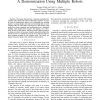Free Online Productivity Tools
i2Speak
i2Symbol
i2OCR
iTex2Img
iWeb2Print
iWeb2Shot
i2Type
iPdf2Split
iPdf2Merge
i2Bopomofo
i2Arabic
i2Style
i2Image
i2PDF
iLatex2Rtf
Sci2ools
104
click to vote
ICRA
2006
IEEE
2006
IEEE
Transfer of Learning for Complex Task Domains: a Demonstration using Multiple Robots
— This paper demonstrates a learning mechanism for complex tasks. Such tasks may be inherently expensive to learn in terms of training time and/or cost of obtaining each training pattern. Learning simple, safe tasks and extending them to more complex tasks can cause faster convergence to the solution. This method has been formalized and demonstrated on a simulated multiple robot (multi-robot) scenario. The objective is to effectively search out and destroy stationary hostile agents present in an unknown urban terrain map. Using the presented method, the robots learn how to effectively map the area, and then improve their learning modules for the complex task. The robots are simple behavioral agents with minimal communication.
Complex Task | ICRA 2006 | Robotics | Such Tasks | Time And/or Cost |
Related Content
| Added | 11 Jun 2010 |
| Updated | 11 Jun 2010 |
| Type | Conference |
| Year | 2006 |
| Where | ICRA |
| Authors | Sameer Singh, Julie A. Adams |
Comments (0)

